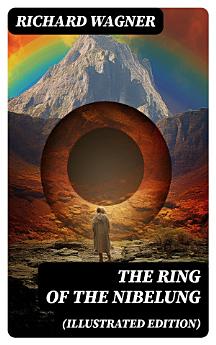The Ring of the Nibelung (Illustrated Edition): Siegfried and the Twilight of the Gods
Richard Wagner
Nov 2023 · DigiCat
Ebook
97
Pages
family_home
Eligible
info
reportRatings and reviews aren’t verified Learn More
About this ebook
Richard Wagner's "The Ring of the Nibelung (Illustrated Edition)" is a monumental opera cycle that weaves together mythological themes and profound philosophical insights within a vibrant tapestry of music and drama. Comprising four operas—"Das Rheingold," "Die Walküre," "Siegfried," and "Götterdämmerung"—Wagner explores the turmoil between gods, heroes, and human potentates, all heightened by his revolutionary use of leitmotifs. The intricately detailed illustrations enhance the narrative, providing visual context that further immerses the reader in this sprawling epic, rooted in Germanic legend and imbued with Wagner's unique vision of destiny and redemption. Richard Wagner, a composer and playwright, is renowned for transforming the operatic landscape in the 19th century. His experiences in the tumultuous political climate of Germany and his deep engagement with philosophy and mythology greatly influenced his work, imbuing it with rich existential questions. Wagner's innovative contributions to music drama, particularly his concept of "Gesamtkunstwerk" (total work of art), allowed him to express complex ideas through a cohesive blend of music, text, and visual art, epitomized in "The Ring." This illustrated edition beckons both scholars and beginners alike, facilitating a deeper appreciation of Wagner's extraordinary vision. Readers will not only engage with the textual intricacies and musical genius but also gain insight into the cultural and historical contexts that birthed this artistic triumph. "The Ring of the Nibelung" promises to be an enlightening journey for anyone passionate about literature, music, and the enduring power of mythology.
About the author
Richard Wagner, born Wilhelm Richard Wagner on May 22, 1813, in Leipzig, was a renowned German composer, theatre director, and conductor who left an indelible mark on the musical landscape of the 19th century. Wagner is best known for his operas, often referred to as music dramas. His compositions are notable for their complex textures, rich harmonies, and elaborate use of leitmotifs—musical phrases associated with specific characters, themes, or locations. Wagner's literary influence is also significant, as he authored both the music and librettos for his works. His seminal cycle, 'The Ring of the Nibelung,' is a tour de force that revolutionized opera with its epic narrative and innovative structure. The 'Ring' consists of four interconnected operas, culminating in the monumental 'Götterdämmerung.' His works, such as the 'Tristan und Isolde,' are famed for their progressive use of chromaticism, which altered the course of Western music. Wagner's legacy endures in the form of the Bayreuth Festival, a dedicated venue for the performance of his works. Despite the controversy surrounding his personal views and associations, Wagner's contributions to the arts continue to be studied and revered for their groundbreaking techniques and unparalleled dramatic depth.
Rate this ebook
Tell us what you think.
Reading information
Smartphones and tablets
Install the Google Play Books app for Android and iPad/iPhone. It syncs automatically with your account and allows you to read online or offline wherever you are.
Laptops and computers
You can listen to audiobooks purchased on Google Play using your computer's web browser.
eReaders and other devices
To read on e-ink devices like Kobo eReaders, you'll need to download a file and transfer it to your device. Follow the detailed Help Center instructions to transfer the files to supported eReaders.







